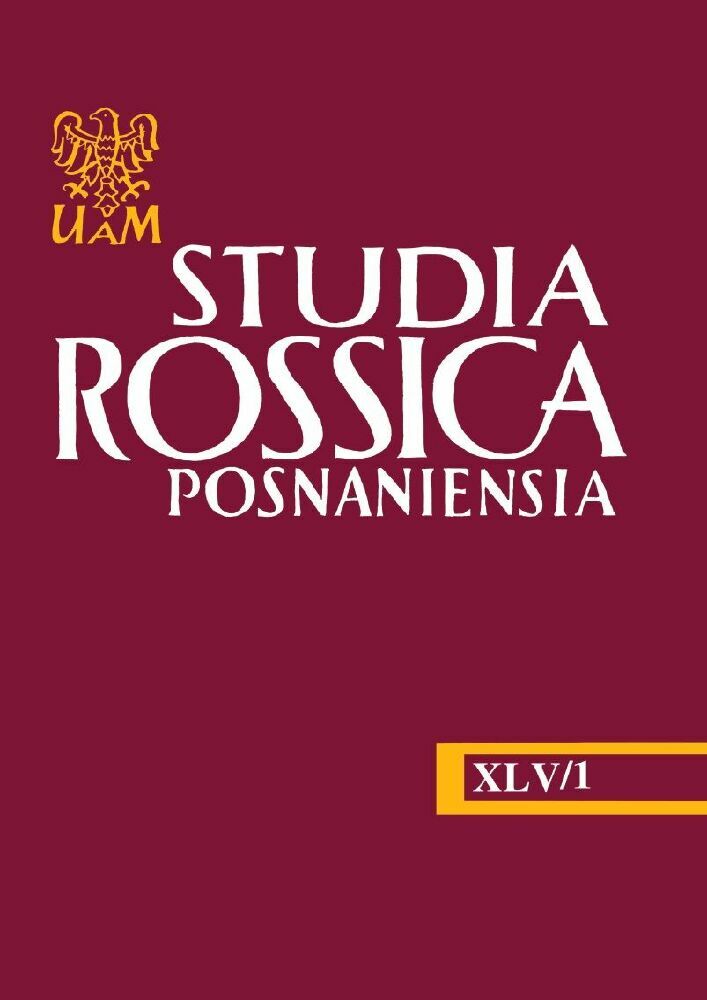Abstrakt
The paper is supposed to consider the formation of Russian compounds based on the imperative construction in comparison with a similar model in Italian. It is believed that in literary Russian this model is not productive, although it occurs in a limited number of examples: for the evaluative names of persons (sorvigolova ‘daredevil’), for the names of animals and plants (vertišejka, perekati-pole) and in some other cases. However, in Romance languages, and particularly in Italian, this is one of the most productive models, although its grammatical status is not usually associated with the imperative construction. As for Russian, it is possible to assume a transformation of the imperative sentences and imperative meaning, and only a particular modal shade of typical actions is preserved. The model itself is represented as a transition from incomplete compounding to the canonical productive model with an interfix. The results of an experiment on the translation of Italian compounds into Russian nonce compounds show a number of transitional cases, supporting this hypothesis.
Bibliografia
Arutûnova, Nina. Problemy morfologii i slovoobrazovaniâ (na materiale ispanskogo âzyka). Moskva, ÂSK, 2007.
Arutûnova, Nina. „Složnye imena suŝestvitelʹnye tipa el guardabosque v sovremennom ispanskom âzyke”. Institut âzykoznaniâ. Doklady i soobŝeniâ. X. Moskva, Izdatelʹstvo Akademii nauk SSSR, 1956.
Bahtin, Mihail. Tvorčestvo Fransua Rable i narodnaâ kulʹtura srednevekovʹâ i renessansa. Moskva, Hudožestvennaâ literatura, 1990.
Benigni, Valentina, Francesca Masini. „Сompounds in Russian”. Lingue e Linguaggio, nr 8 (2), 2009, s. 171–193.
Chung, Karen Steffen. „V+N Function-Describing Compounds”. Bulletin of the College of Liberal Arts. National Taiwan University, nr 41, 1994, s. 181–221.
Darmesteter, Arsène. Traité de la formation des mots composés dans la langue française, comparée aux autres langues romanes et au latin. Paris, Librairie A. Franck, 1874.
Fedorova, Lûdmila. „Malenʹkie komedii složnyh slov”. Logičeskij analiz âzyka. Âzykovye mehanizmy komizma. Red. Nina Davidovna Arutûnova. Moskva, RAN IÂ, 2007, s. 699–711.
Fedorova, Lûdmila. „O smehovoj prirode modeli složnyh slov-prozviŝ v slavânskih i romanskih âzykah”. Vostocnoslavânskie âzyki i literatury v istoriceskom i kulʹturnom kontekstah: kognitivnaâ lingvistika i konceptualʹnye issledovaniâ. Red. Mаrina Pimenova. Kiev, IÂ im. Potebni NAN Ukrainy, 2012, s. 380–387.
Fedorova, Lûdmila, Chiara Nakkarato. „Okkazionalʹnoe slovosloženie v russkom âzyke: produktivnostʹ i analogiâ”. Studi di linguistica slava. Nuove prospettive e metodologie di ricerca./Studie ricerche – 20. Edizioni Ca’ Foscari. Digital Publishing, 2019, s. 155–173.
Nemčenko, Vasilij. Sovremennyj russkij âzyk. Slovoobrazovanie. Moskva, Vysšaâ škola, 1984.
Rosenberg, Maria. La formation agentive en français: les composés [VN/A/Adv/P]N/A et les dérivés V-ant, V-eur et V-oir(e). Stockholms universitet, Doktorsavhandling, 2008.
Scalise, Sergio. Morfologia. Bologna, Il Mulino, 1994.
Scalise, Sergio, Antonietta Bisetto. „The Classification of Compounds”. The Oxford Handbook of Compounding. Red. Rochelle Lieber, Pavol Stekauer. New York, Oxford University Press, 2009.
Švedova, Natalʹâ, red. Russkaâ grammatika. T. I. Moskva, Nauka, 1980.
Thornton, Anna. „Italian verb reduplication between syntax and the lexicon”. Rivista di Linguistica, nr 21 (1), 2009, s. 235–261.
Villoing, Florence. „Les mots composés VN du français: argument en faveur d’une construction morphologique”. Cahiers de Grammaire, Morphologie et Lexique, nr 28, 2002, s. 183–196.
Licencja
PRACE PUBLIKOWANE W CZASOPIŚMIE DOSTĘPNE SĄ NA LICENCJI CREATIVE COMMONS:
Uznanie autorstwa-Użycie niekomercyjne-Na tych samych warunkach 4.0 Międzynarodowe.
Autorzy tekstów przyjętych do publikacji w czasopiśmie „Studia Rossica Posnaniensia” są zobowiązani do wypełnienia, podpisania i odesłania na adres redakcji umowy o udzielenie nieodpłatnej licencji do utworów, z zobowiązaniem do udzielania sublicencji Creative Commons.
Zgodnie z umową, autorzy tekstów opublikowanych w czasopiśmie “Studia Rossica Posnaniensia” udzielają Uniwersytetowi im. Adama Mickiewicza w Poznaniu niewyłącznej i nieodpłatnej licencji oraz zezwalają na użycie sublicencji Attribution-NonCommercial-ShareAlike 4.0 International (CC BY-NC-SA 4.0).
Autorzy zachowują prawa do dalszego, swobodnego rozporządzania utworem.
Autorzy, którzy wykorzystują w swoim tekście cudze utwory (np. ilustracje, fotografie) proszeni są o dostarczenie do redakcji czasopisma zgody na publikację.
Użytkownicy internetu uprawnieni są do korzystania z utworów opublikowanych po 2015 roku “Studia Rossica Posnaniensia” tylko w celach niekomercyjnych, pod następującymi warunkami:
https://creativecommons.org/licenses/by-nc-sa/4.0/
Uniwersytet im. Adama Mickiewicza w Poznaniu zachowuje prawo do czasopisma jako całości (układ, forma graficzna, tytuł, projekt okładki, logo itp.).

